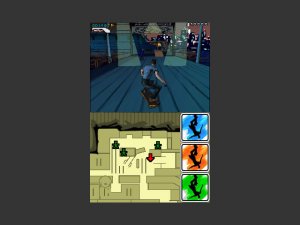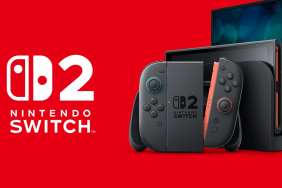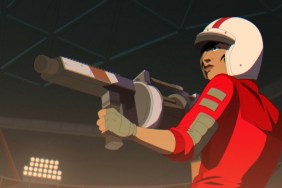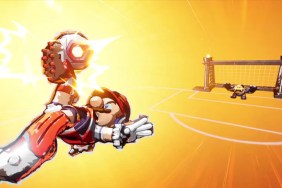Grind on, you crazy diamond.
Catching up with diminutive yet useful iPods, cell phones, and computers, Tony Hawk finally gets a handheld port that maintains the well-established grace of its hefty console brothers. Tony Hawk’s American Sk8land shreds a new line on the DS without losing too much in the crunch.
If you’re totally new to the series, get out from under that Martian rock and head over to my Tony Hawk’s American Wasteland review to get our bearings on this latest edition. Don’t read too hard, though, because this DS version makes a lot of significant changes to the formula.
Most obvious is the graphical overhaul. A simplified cel-shading engine allows a nice, solid framerate with minimal sacrifice of feel. Things are a bit blocky and bland and you’ll notice a good deal of pop-up, but what matters is that it retains the utterly refined control and densely packed levels of its kin.
While lacking a few buttons when compared to a console controller, Sk8land does a good job making up for it by eliminating run-outs, arguably one of the more useless portions of the last few releases. The touch screen is used primarily as an overhead map, showing mission locations as well as their objectives with some decent attention to detail (if you’re grinding six pigeons off a rail, you see six little birdie icons on the map.) It also controls the camera when stopped for checking out those hard-to-reach places and delivers instructions for goals.
Beyond simple map functionality, the touch screen can also be used for, uh, touching. Focus mode (skateboarding meets The Matrix) is activated by tapping the bottom left corner, and special tricks are now lined up along the right edge, though they can still be triggered with a button combination. Alone they’re all pretty simple implementations, but add up to utilize the DS’s capabilities nicely and work well as alternatives to the base control.
Also new is the fitting simplicity of the Story mode. Instead of impressing a group of skate rats, making friends, and building a Skate Ranch, you start off with a little animation of you winning a local competition, running right into Hawk-san, jumping on his bus and going to L.A. to build a bitchin’ skatepark. The fluff has been removed, and as a result the game fits much better into the restrictions of handheld gaming, allowing you to play for short periods of time and still get a lot done. You’ll cruise through seven levels, and although the interconnected-area scheme is still around, you’re presented with a small loading screen instead of streaming.
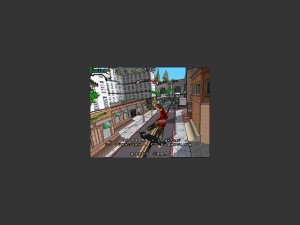 Every story mission will net you cash, and after completing enough of them, a pro will show up to help you put a new piece in your warehouse, blowing some of your not-so-hard-earned dough. The difficulty is split into rookie and pro modes, with pro offering a few more goals per level and slightly higher point requirements, but like American Wasteland, if you’re a vet of the series, you’re likely to burn right through either pretty quickly. I will state for the record that though the goals in Sk8land are brand new, they are as repetitive as ever due to their ease and grow stale quickly.
Every story mission will net you cash, and after completing enough of them, a pro will show up to help you put a new piece in your warehouse, blowing some of your not-so-hard-earned dough. The difficulty is split into rookie and pro modes, with pro offering a few more goals per level and slightly higher point requirements, but like American Wasteland, if you’re a vet of the series, you’re likely to burn right through either pretty quickly. I will state for the record that though the goals in Sk8land are brand new, they are as repetitive as ever due to their ease and grow stale quickly.
Classic mode is included as well, with the ol’ two-minute rampages through the same areas with the same old Tony Hawk goals of ‘collect S-K-A-T-E’ and ‘beat this score.’ The levels this title shares with its brethren are familiar, but tweaked enough to be unique. And as we saw in THUG 2 Remix for the PSP, there’s also some throwback offered with a retooling of the Alcatraz level from THPS 4.
Once again, the motivation to complete the single-player lies in the online play, since you can only host levels you’ve unlocked. Online play comes in two-player Ad Hoc and WiFi flavors (remember, the DS is now online), complete with friends lists and random pairings. While axing staple H-O-R-S-E and Graffiti Tag modes, Sk8land introduces a new “The Price is Wrong” mode, having two competitors aim for a set score without going over, ala a certain television show. If you do go over, your tricks subtract points to get you back in line.
 It might be smaller, but the console game’s absurd high score problem exists on the handheld version, too. A five-minute Trick Attack session had me competing against scores in the billions. Once players are scoring in the billions, it’s time to rework something.
It might be smaller, but the console game’s absurd high score problem exists on the handheld version, too. A five-minute Trick Attack session had me competing against scores in the billions. Once players are scoring in the billions, it’s time to rework something.
Outside of being ruthlessly stomped online, you’re also able to post your single-player scores, deck and graffiti graphics, and replays saved from Classic mode runs, as well as download everyone else’s stuff. Every month, new mission goals are available to download for fresh competition from Activision. The game’s website also posts leader info, allows you to form a ‘sk8 crew’ with your pals, check for new content, and quickly browse everyone’s custom art, leading to a surprising amount of depth for a trimmed-down port.
Speaking of trimmed, the soundtrack includes a whopping 13 songs. I don’t care how good the songs are – 13 songs get old fast. You at least get to mess around with the DS mic by recording custom sounds used for stuff like finding gaps and bailing. Hearing myself say “good stuff!” every time I clear a gap is narcissistically thrilling, as is hearing what I made it say whenever I bailed.
All in all, the game’s pick-up-and-play take on THPS fits snugly in its handheld home. It’s nice to spend a few minutes getting some goals knocked out while waiting for the bus, and while the world may be tiring of Hawk style, now you can have a respectable version in your pocket.
-
Tony Hawk gameplay in a handheld
-
Smooth new graphics
-
Online play, plus downloads
-
Too easy
-
Repetitive missions
-
Still the same old Tony
